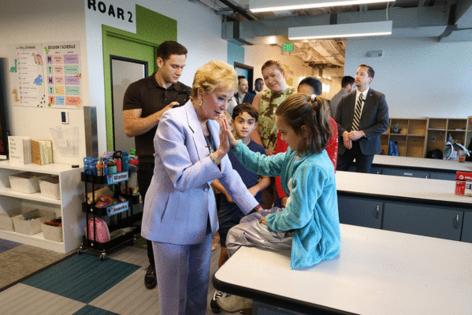Kaitlyn Buss: Secretary McMahon's education agenda puts parents first
Published in Op Eds
DETROIT -- U.S. Education Secretary Linda McMahon’s most radical belief is that parents should get the say in how their kids learn.
That’s part of why she is seeking to return education to the states — to the fullest extent possible without an act of Congress that eliminates the Department of Education altogether — and encouraging them to adopt policies that prioritize parents and students, not big-government schools.
“I know the president firmly believes that the best education is that which is closest to the child,” McMahon told me on Monday, following her visits to three Michigan schools as part of her “Returning Education to the States” tour.
“I think money should follow the child,” she says. “The president certainly believes that no child should be trapped in a failing school. And if that parent has the opportunity to move that child out of a public school to a private school, then I think they should have the ability to do that.”
McMahon’s mission has riled Democrats and teachers' unions as it values choice over public education’s monopoly on taxpayer dollars. And the Trump administration has been criticized for the potential effects on at-risk students of cuts to the Education Department.
McMahon states that funding for programs, such as Title I and the Individuals with Disabilities Education Act (IDEA), will continue to be allocated through a federal government agency to states, and that removing previous Ed Department compliance costs will free up funding for local districts in states.
But she wants the lasting impact of her tenure to be helping states succeed in educating on their own.
In distressing scores released Tuesday, 12th graders nationwide had the worst average math score since testing for the National Assessment of Education Progress, the nation’s gold-standard exam, began in 2005, and the lowest reading scores ever recorded, beginning in 1992. A third of 12th graders tested last year did not have basic reading skills.
Public education needs a complete overhaul. McMahon is betting that change starts from the ground up, not the top down.
“We are failing the children in this country,” McMahon says. “We are literally failing them. I think, with the best of intentions, No Child Left Behind, Common Core curriculum, Race to the Top all had the idea that this would be a national product, that it would raise the level of schools, and it didn’t. This is a different approach. This is how we hope to help you be better.
“What I want to do is to be able to go to those areas that are most successful and take best practices and put together tool kits.”
McMahon is focused on ways states can improve academic basics — especially reading — to prepare students for life and the workforce. She's also eager to see U.S. history and civics, "warts and all," taught throughout every grade.
McMahon is looking beyond the walls of traditional schooling to everything from classical charter schools, to "microschools," religious schools and AI-led schools to identify the types of education that actually yield the best outcomes.
“It's going to be very interesting to see where the commonalities are,” she says.
Nowhere is the crisis in education clearer than in Michigan, where, despite spending more money on education and literacy, 61% of third graders, more than last year, can’t read well enough to pass the state’s assessment.
A new provision in the One, Big Beautiful Bill would open up scholarship-granted funding to parents for a host of educational services, including tutoring for public school students. But Michigan needs to opt in.
“Behind,” is where McMahon says Michigan and other states will be if they don’t get on board with that and other reforms. “That's just the fact. They won't make the steps that other states will make, which is a crime.”
McMahon thinks it’s common sense that state-level education leaders like governors and state superintendents would be eager to innovate and build on proven results elsewhere — whether that means following teaching models that actually work, allocating funding to give parents more choice or developing programs that meet unique community needs.
“What state wouldn’t want to make that available, you know, for their kids?” she says. “Shame on them if they’re not doing that.”
____
©2025 www.detroitnews.com. Visit at detroitnews.com. Distributed by Tribune Content Agency, LLC.
























































Comments